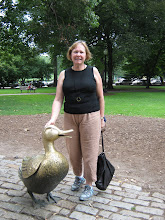The Final Chapter is an article by journalist Greg Callaghan which is published in the Sydney Morning herald's magazine Good Weekend today. It doesn't say anything that passionate literacy and English teachers didn't know, but once again it highlights some of the trends in schools today. We need to do something about Reading for Pleasure!
Schools have made the change towards teaching more systematic phonics in the early years of school, but this doesn't make children readers. It means they can read, but will they choose to read when there are so many other things vying for their time? What is the role of parents in the reading continuum? What is the role of libraries, especially school libraries and teacher librarians? This article talks about this. Children need to hear good examples of oral reading. They need to be exposed to a wide variety of reading resources and yes, this can include eBooks and reading on devices, but not to the exclusion of books.
If I plan a library lesson and it doesn't include me reading something to the students they say, 'but you didn't read to us today, we can't go yet'. More than ever students are enamoured of being read to. It is almost a novelty for them. A kindergarten mum once said to me, 'I wasn't aware that I am meant to read to my child!' We still have so much parent education to impart. So why are school getting rid of libraries and teacher librarians? Why are there school principals who think a school library needs none to very little funding for books? Why does the new NSW English curriculum advocate reading to students and giving students time to read for themselves, but then fills up the time allocated to English with so much teacher instruction? Teachers constantly say 'oh there isn't time to read', we have so much to get through in the published units of work'.
This also means teachers are not reading much for themselves, unless it is prescribed. If it is prescribed, it then is published elsewhere such as on Spotify, Story Box Library, websites, etc, so teachers do not have to read it. They listen and watch with their students. I am not blaming teachers for doing this, I am just saying if we want teachers to be engaged in their own learning they too need time to explore what is on offer and build their own field knowledge of books. If not, then that is the teacher librarian's role and s/he needs to be able to read to students without other staff members thinking that that is not the best use of their time.
In a staff meeting held in the library and run by me, I asked teachers to list 6 Australian authors or illustrators of children's books, thinking that would be easy. Yes they know Aaron Blabey, Anh Do, Alison Lester and Mem Fox then it became harder. 6 non-Australian was easier. They know Dav Pilkey, Roald Dahl, Julia Donaldson,... 6 children's poets? Some hadn't even heard of Michael Rosen, so we have to spend more time on building the field and reading it. I tried to run a book club for teachers on the staff and I got six staff to come once a fortnight and we did picture books and short novels, but not one classroom teacher came, citing they just do not have time.
Schools (and families) really do need to look at their priorities. The parents who frequent our school library generally have children who revel in reading. They are the students that do well at the end of school. I met a mother of a past student in the supermarket this week and she was so excited to tell me that he was doing an English degree and had rediscovered the joys of reading. We do not all have to have or do an English degree to love reading, but it does start at home and in the early years of school. We need to 'catch' children and make them 'readers for life'. Schools need to make it easy for parents to read to their children. Schools need to make time for reading.
The UK has falling literacy rates as well, but it has realised phonics is not enough to make readers. They are implementing Reading for Pleasure programs in schools. Some schools in Australia have had the benefit of input by advocates such as Margaret Merga and they too now stop everyday to read at school. See Queenwood's Just Read program.
Thank you Greg for this article. Hopefully parents and teachers will read it and lobby their schools to do more about Reading for Pleasure so that they too realise what you wrote in your conclusion
'Multiple studies have shown that those who read for pleasure for 30 minutes or more a day enjoy higher self-esteem, a substantially lower risk of depression, are less lonely, and 58 percent more likely to empathise with others.'


Fabulous response to the SMH article. Your piece also needs to be shared far and wide. So many of your carefully considered points resonated with me. Huge thanks for this post.
ReplyDelete